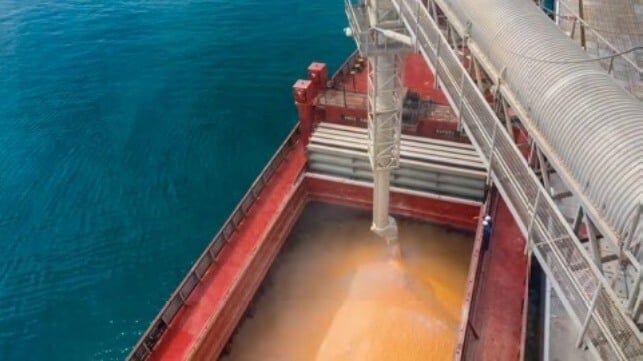Report: Shipping Carbon Tax Will Impact African Economies and Food Security

As the push towards the introduction of a global carbon tax on shipping gains momentum, a new report is highlighting that African economies are likely to be adversely affected. The report warns the tax may also negatively impact food security. Three Africa-focused policy organizations concluded that as the International Maritime Organization (IMO) moves forward with plans to introduce a levy/tax/carbon price mechanism aimed at putting a price on carbon to discourage shipping emissions, Africa must brace for impacts.
For the continent, the report warns that the imposition of a levy on carbon is likely to reduce the supply of maritime shipping services among African countries by up to seven percent, with imports and exports expected to suffer significantly. The higher shipping costs will impose additional costs on the transportation of merchandise, thereby increasing the price of imports. Ultimately, they conclude that imports are bound to decline by 0.04 percent while exports will increase by 0.21 percent in aggregate.
Also to be affected is the gross domestic product (GDP) of a majority of countries, albeit marginally. In the case of Equatorial Guinea, which would be the worst affected, the tax would slash the GDP by 0.121 percent.
The report also warns that a carbon tax on shipping would negatively impact food security in Africa, a continent that is already grappling with acute food shortage with about 20 percent of the population being undernourished. When imposed, the carbon tax the report states will increase the global prices of agriculture and processed food commodities by 0.011 percent and 0.013 percent respectively.
Considering that Africa is a net importer of food, the increase risks worsening the problem of food security in the continent which spends between $60 billion and $80 billion annually to import food. The report indicated that the levy would instigate a decrease in imports of agricultural commodities by countries including Egypt, Morocco, Ghana, Nigeria, and Ethiopia. DR Congo, Equatorial Guinea, Kenya, Zambia, and South Africa, however, could see an increase in the value of food imports.
Another impact of the tax would be on household incomes, which would fall in most individual African countries. A case in point is Ghana, which is forecast to experience a 0.101 percent reduction, 10 times the reduction forecast for European household incomes. Ghana’s limited fleet would also become too costly to operate and risks being rendered obsolete if stringent emission reduction measures are implemented the report warns.
Titled “Navigating climate action: Assessing the economic impacts and trade-offs of a shipping carbon tax for African states,” the report was done by the Africa Policy Research Institute, the Firoz Lalji Institute for Africa at the London School of Economics and Political Science, and the African Future Policies Hub.
The organizations used the Global Trade Analysis Project Energy-Environmental (GTAP-E) Computable General Equilibrium (CGE) model to come up with their findings, which examined the impacts of the tax on both the African economy as an aggregate and selected individual African economies.
“In general, the results show that a shipping levy is expected to reduce international trade, increase the cost of shipping, increase prices of commodities, and marginally reduce GDP and household incomes across the continent,” states the report.
The introduction of a global carbon tax on shipping to curb greenhouse gas (GHG) emissions looks inevitable after the IMO adopted the Strategy on Reduction of GHG Emissions from Ships last year. The tax, which is designed to push the industry towards the use of greener fuels and technologies, gained increasing support during the MPEC meeting concluded last week and set in 2025 to finalize the emissions programs including the structure of the carbon levee.
The report recommends that the IMO adopt GHG reduction measures that allow for the redistribution of a significant portion of the revenues raised towards funding out-of-sector mitigation and resilience. In essence, the IMO should ensure that the costs and benefits of efforts to cut emissions from shipping are equitably shared between countries conclude the authors of the report.
The opinions expressed herein are the author's and not necessarily those of The Maritime Executive.
